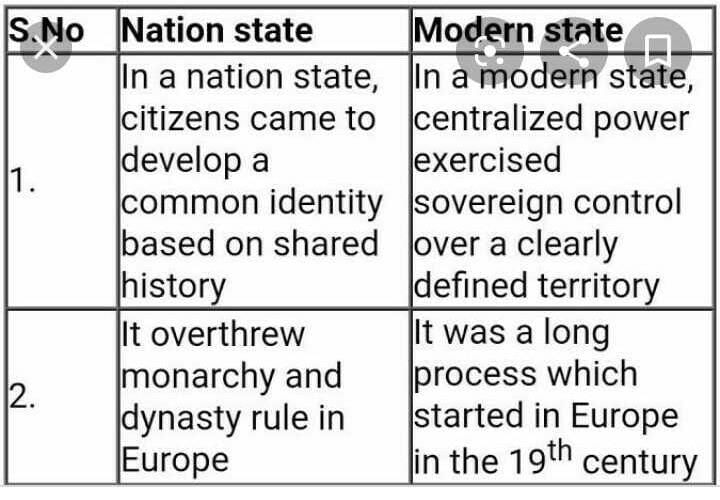Class 10 Exam > Class 10 Questions > Differentiate between modern state and Nation...
Start Learning for Free
Differentiate between modern state and Nation state?
Most Upvoted Answer
Differentiate between modern state and Nation state?

Community Answer
Differentiate between modern state and Nation state?
Modern State vs Nation State
The modern state and nation state are two concepts that are often used interchangeably, but they are not the same thing. While they share some similarities, they also have distinct differences that set them apart.
Modern State
The modern state is a political entity that emerged in Europe during the 16th and 17th centuries. It is characterized by the following features:
- Centralized power: The modern state has a strong central government that exercises authority over a defined territory.
- Bureaucracy: The modern state is characterized by a hierarchical administrative system that is responsible for implementing policies and delivering public services.
- Legal system: The modern state has a codified legal system that sets out the rights and responsibilities of citizens, and provides a framework for resolving disputes.
- Monopoly on violence: The modern state has a monopoly on the legitimate use of force within its territory, and is responsible for maintaining law and order.
- Sovereignty: The modern state is a sovereign entity that is recognized by other states as having the right to govern its own affairs without interference.
Nation State
The nation state, on the other hand, is a political entity that is defined by a shared sense of identity based on factors such as language, culture, religion, or ethnicity. It is characterized by the following features:
- National identity: The nation state is based on a shared sense of national identity that is defined by cultural, linguistic, or ethnic factors.
- Homogeneity: The nation state is characterized by a high degree of ethnic or cultural homogeneity.
- Democratic legitimacy: The nation state derives its legitimacy from the consent of the governed, and is accountable to its citizens through democratic institutions.
- Territorial integrity: The nation state is defined by a clearly defined territory, and is responsible for maintaining its territorial integrity.
Differences between the Modern State and Nation State
While the modern state and nation state share some similarities, they also have distinct differences that set them apart:
- The modern state is defined by a centralized government, while the nation state is defined by a shared sense of identity.
- The modern state is characterized by a codified legal system, while the nation state is characterized by a shared cultural or ethnic heritage.
- The modern state is based on a system of bureaucracy, while the nation state is based on a system of democratic legitimacy.
Overall, while there are some overlaps between the concepts of modern state and nation state, they are distinct political entities that are defined by different characteristics. Understanding these differences is important for understanding the complexities of modern politics and international relations.

|
Explore Courses for Class 10 exam
|

|
Question Description
Differentiate between modern state and Nation state? for Class 10 2025 is part of Class 10 preparation. The Question and answers have been prepared according to the Class 10 exam syllabus. Information about Differentiate between modern state and Nation state? covers all topics & solutions for Class 10 2025 Exam. Find important definitions, questions, meanings, examples, exercises and tests below for Differentiate between modern state and Nation state?.
Differentiate between modern state and Nation state? for Class 10 2025 is part of Class 10 preparation. The Question and answers have been prepared according to the Class 10 exam syllabus. Information about Differentiate between modern state and Nation state? covers all topics & solutions for Class 10 2025 Exam. Find important definitions, questions, meanings, examples, exercises and tests below for Differentiate between modern state and Nation state?.
Solutions for Differentiate between modern state and Nation state? in English & in Hindi are available as part of our courses for Class 10.
Download more important topics, notes, lectures and mock test series for Class 10 Exam by signing up for free.
Here you can find the meaning of Differentiate between modern state and Nation state? defined & explained in the simplest way possible. Besides giving the explanation of
Differentiate between modern state and Nation state?, a detailed solution for Differentiate between modern state and Nation state? has been provided alongside types of Differentiate between modern state and Nation state? theory, EduRev gives you an
ample number of questions to practice Differentiate between modern state and Nation state? tests, examples and also practice Class 10 tests.

|
Explore Courses for Class 10 exam
|

|
Signup for Free!
Signup to see your scores go up within 7 days! Learn & Practice with 1000+ FREE Notes, Videos & Tests.


















